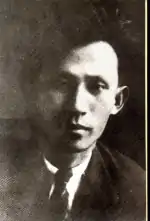Yi Sang
Lee Sang (September 23, 1910 – April 17, 1937) was an author of modern Korean literature.[1]
Lee Sang | |
|---|---|
 | |
| Born | Kim Hae-Kyung September 23, 1910 |
| Died | April 17, 1937 (aged 26) |
| Occupation | Writer Poet Novelist |
| Organization | Kuinhoi (Circle of Nine, 구인회, 九人會) |
Notable work | Crow’s Eye View The Wings |
| Yi Sang | |
| Hangul | 이상 |
|---|---|
| Hanja | |
| Revised Romanization | I Sang |
| McCune–Reischauer | I Sang |
| Birth name | |
| Hangul | 김해경 |
| Hanja | |
| Revised Romanization | Gim Haegyeong |
| McCune–Reischauer | Kim Hae-gyŏng |
Life
Though most widely known by his pen name, Yi Sang was born in Seoul, Korea, as Kim Hae-gyeong on September 14, 1910, in Seoul. He graduated from Sinmyeong School and then entered the Donggwang School. In 1922 he was admitted to Posung School. In 1929 he graduated from Gyeongseong Engineering High School with training as an architect and for a time was employed as a draftsman in the public works department of the Government-General of Korea. In December 1929 he won first and third prizes in a design contest for the cover of Korea and Architecture (Joseongwa geonchuk), and the journal of the Korean Architecture Society (Joseon geonchukhoe), respectively. Most of his works were produced during the 1930s.[2]
In 1934 he joined the Circle of Nine (Guinhoe), whose core members included Kim Girim, Lee Taejun, and Jung Jiyong. In 1936 Lee began to edit the Circle of Nine[3] (GuInhoe, whose core members included Kim Girim, Lee Taejun, and Jung Jiyong) journal, Siwa soseol, published by Changmunsa under the aegis of Koo Bonung. Several of his works were published in this journal, including his poems “Paper gravestone” (Jibi), “Street exterior, street passage” (Gaoe gajeon), and “Condition serious” (Widok) and the stories “Meeting of a spider and a pig” (Jijuhoesi), “Wings” (Nalgae), “Meetings and Farewells” (Bongbyeolgi), and “Children's Skulls” (Donghae). His short story “Diary Before Death” (Jongsaenggi) and his personal memoir “Monotony” (Gwontae) were published posthumously in Tokyo.[2]
In November 1936 he went to Japan, where he was arrested by Japanese police the following year. He was released on bail and admitted to Tokyo University Hospital, where he died on April 17, 1937.
Work
Yi was perhaps the most famous avant-garde writer of the colonial era. In his work he experimented with language, interiority, separation from inside one's self as well as the outer world. His poems, particularly, were influenced by Western literary concepts including Dadaism and Surrealism. Yi's history in architecture influenced his work, which often included the languages of mathematics and architecture including, lines, dots, number systems, equations and diagrams.[4]
His literary legacy is punctuated by his modernist tendencies evinced throughout his oeuvre. His poems reveal the desolate internal landscape of modern humanity and, as in “Crow's eye view poem” (Ogamdo si je1ho), utilize an anti-realist technique to condense the themes of anxiety and fear. His stories disjoint the form of traditional fiction to show the conditions of the lives of modern people. “Wings” (Nalgae), for example, utilizes a stream-of-consciousness technique to express these conditions in terms of the alienation of modern people, who are fragmented commodities unable to relate to quotidian (daily) realities.[2]
Yi Sang never received much recognition for his writing during his lifetime, but his works began to be reprinted in the 1950s. In the 1970s his reputation soared, and in 1977 the Yi Sang Literary Award was established. In 2007, he was listed by the Korean Poets' Association among the ten most important modern Korean poets.[5] His most famous short story is "The Wings" ("Nalgae", Korean: 날개), and his poem "Crow's-Eye View" is also well-known.
Works in translation
- Yi Sang: Selected Works, Seattle and New York: Wave Books, 2020. ISBN 9781950268085.
- The Wings, Seoul: Jimoondang Publishing, 2001. ISBN 89-88095-50-2.
- Three Poets of Modern Korea: Yi Sang, Hahm Dong-seon, and Choi Young-mi, Louisville: Sarabande Books, 2002. ISBN 1-889330-71-X
- Meetings and farewells : Modern Korean stories, Chong-wha Chung St Lucia QLD: University of Queensland Press, 1980. ISBN 0702215538[6]
- The Wings : eBook I-AHN CREATIVE, 2015. ISBN 89-98659-02-6.[7]
Works in Korean
Short stories
- Wings (1936) First published in literary magazine Jogwang, Sep. 1936 (issue 11)
Essays
- Lingering Impressions of a aMountain Village - a Few Paragraphs from a Journal of Travels to Seongcheon (1976) In Azalea, issue 2, p .331.
Collections
- Collected Works of Yi Sang (1956, 1977, 1991)
References
- Lew, Walter K.; Henry H. Em; et al. (April 1995). "Portfolio: Yi Sang (1910–1937)". Muae. New York: Kaya (1): 70–149. ISBN 0702215538.
- Im Hon-yong (1996). "Yi Sang". In Korean Culture & Arts Foundation (ed.). Who's who in Korean literature. Seoul: Hollym. pp. 518–520. ISBN 1-56591-066-4.
References
- "이상" biographical PDF available at LTI Korea Library or online at: "Archived copy". Archived from the original on September 21, 2013. Retrieved September 3, 2013.CS1 maint: archived copy as title (link)
- "Yi Sang" LTI Korea Datasheet available at LTI Korea Library or online at: "Archived copy". Archived from the original on September 21, 2013. Retrieved September 3, 2013.CS1 maint: archived copy as title (link)
- Lee, Kyung-ho (1996). "Ahn, Jung-Hyo". Who's Who in Korean Literature. Seoul: Hollym. pp. 318–219. ISBN 1-56591-066-4.
- Yi Nam-ho, U Ch’anje, Yi Kwangho, Kim Mihyeon (2005). "Lee Hye-gyeong". Twentieth-Century Korean Literature. EastBridge Signature Books Series. p. 24. ISBN 978-1891936456.CS1 maint: uses authors parameter (link)
- Chung, Ah-young (October 15, 2007). "Top Ten Korean Modern Poets Selected". The Korea Times. Retrieved February 15, 2020.
- Author Database: Yi Sang - LTI Korea http://eng.klti.or.kr/ke_04_03_011.do?method=author_detail&AI_NUM=283&user_system=keuser
- The Wings : eBook I-AHN CREATIVE, 2015. ISBN 89-88095-50-2. https://books.google.co.kr/books?id=x6EZBgAAQBAJ